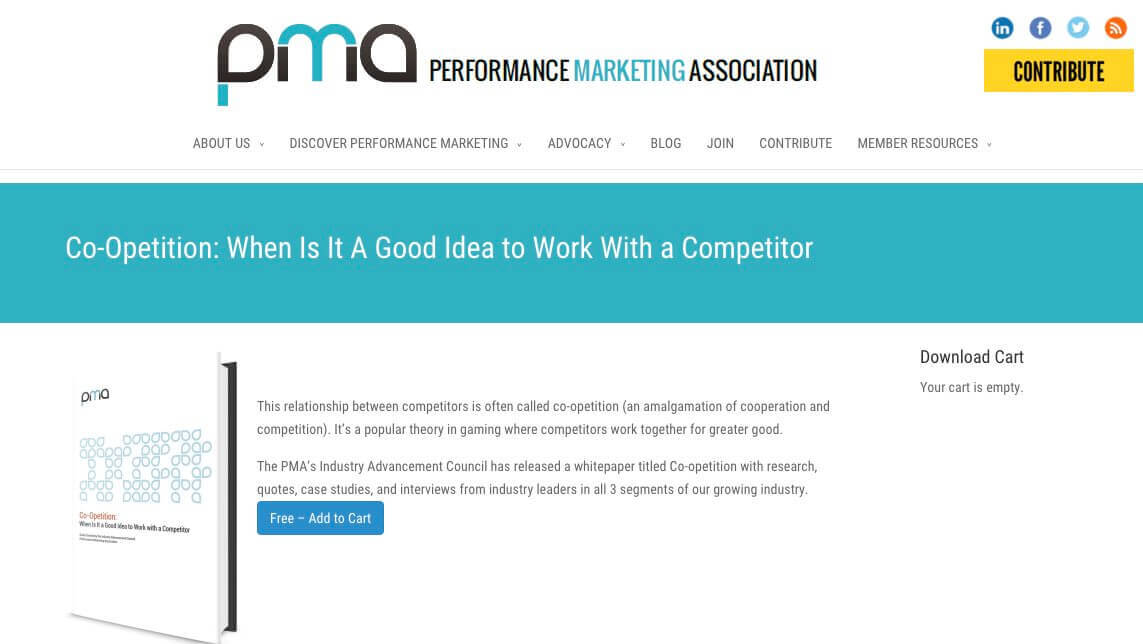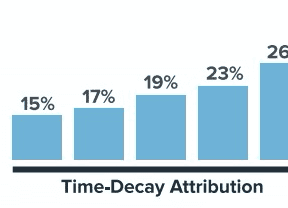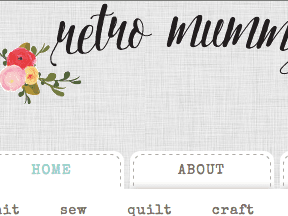The Performance Marketing Association promotes the growth and practices of the affiliate marketing industry. The PMA recently published a free whitepaper exploring the notion of “co-opetition” as it applies to affiliate marketing. Co-opetition — the word derives from “coöperation” and “competition” — is where competing entities coöperate, at least partially, through sharing information, partnering to develop new technologies, and even brand collaboration.
The PMA whitepaper cites examples of co-opetition in the affiliate industry that drive growth and innovation. (I am a member of the PMA, but I do not sit on the council that issued the whitepaper.) These partnerships occur between affiliates, agencies, and even technology platforms.
In the report, Todd Crawford, co-founder and vice president of strategic initiatives at Impact Radius, a digital marketing platform, said, “There can be justifications for working with a competitor… It could be a good idea if there are complementary technologies or services that make sense for clients to work with both parties, or if there is an acquisition interest and testing the fit via a partnership makes sense.”

A new whitepaper from the Performance Marketing Association describes instances of coöperation between competitors — i.e., “co-opetition” — in the affiliate marketing industry.
Co-opetition with Affiliates
One example of co-opetition cited in the whitepaper is a partnership between two affiliate entrepreneurs: Tricia Meyer, founder of Sunshine Rewards, and Carrie Rocha, founder of Pocket Your Dollars. Both women built communities around shared interests. SunshineRewards.com brings deal seekers together by offering cash back rewards as well as a forum where members can share tips and advice.
PocketYourDollars.com educates readers on how to save money and stretch their budgets. Both sites are monetized through affiliate links, which means that both earn revenue when a reader clicks an affiliate link and completes some sort of action.
Two years ago, Rocha decided she wanted to offer rewards for Pocket Your Dollars members. She approached Meyer with her idea, and asked if she could use the platform — via a “white label” arrangement — that Meyer had already built for Sunshine Rewards. Meyer agreed, and from there the two women worked with a mediator to establish basic partnership terms.
“We outlined our expectations in positive terms rather than negative terms. We set commission percentages and the basics of what we needed from each other, and also the hope for future advances,” said Meyer in the PMA report.
The pair has experienced mutual benefits from the arrangement, including new revenue streams and new members on both sites. They have also shared information, which has helped both to optimize their sites. “We work together a lot to optimize our merchant offerings and the terms of those merchant agreements,” Rocha said.
Co-opetition beyond Affiliates
Co-opetition in the affiliate space is not limited to affiliates. The whitepaper also highlights a partnership between LinkConnector, an affiliate network, with the aforementioned Impact Radius and digital agency SmarterChaos. Through this partnership, SmarterChaos-managed affiliate programs that run on the Impact Radius platform are also made available on the LinkConnector affiliate network, with all reporting data flowing through both platforms.
To date, the partnership has produced four separate campaigns and over 50 active affiliates. And the arrangement benefits all three partners. LinkConnector has a larger variety of offers for its affiliates, which provides greater earning potential for the affiliates and for the network. SmarterChaos gets greater exposure to more affiliates. Impact Radius benefits from increased performance and provides transparency for the merchant.
“Because of the quality of offers brought to the table by SmarterChaos and the quality of the Impact Radius platform, LinkConnector did not hesitate to pursue this collaboration. And, we view the experience as positive and expect it to continue for the foreseeable future,” said Choots Humphries, co-founder and co-president of LinkConnector, in the report.
Digital Agencies, Too
The third example of co-opetition in the PMA whitepaper is a partnership between two digital agencies: eAccountable and lotus823. Both work with companies to develop strategies across various digital marketing channels, but each agency has different core competencies. eAccountable specializes in affiliate and performance marketing, while lotus823 has mostly focused on public relations and social media.
The two agencies began collaborating last year when lotus823 sought an agency with performance marketing expertise to build integrated marketing plans for lotus823’s clients. In the PMA whitepaper, Durk Price, founder and CEO of eAccountable, said that the results of a modest initial test exceeded everyone’s expectations in terms of sales and effective cost. That test led to increased utilization of eAccountable tools by lotus823.
“Our pricing model and rev share with the agency [lotus823] did not significantly raise costs of the program above a normal agency pricing model. The joint effort was first and foremost profitable for the advertiser and then secondly the effort was profitable for lotus823 and for our company,” Price said.
The two companies now work together on more client accounts.
The PMA whitepaper recommends two practices for a smooth partnership. First, create a formal agreement that outlines financial terms, communication flows, and the scope. Second, ensure a nondisclosure agreement is in place so that both parties’ proprietary information is protected.




